Bam! Pow! Scream! Novelist Shelley Harris dons a mask, cape and boots to become an everyday superhero on her local high street
Shelley Harris was once a regular forty-something quietly going about her suburban life. But, with a new year comes a new beginning, and Shelley was resolved to make her community a better place. For one day she became ... Liberty! But would the citizens of High Wycombe need saving - or would she need saving from herself?
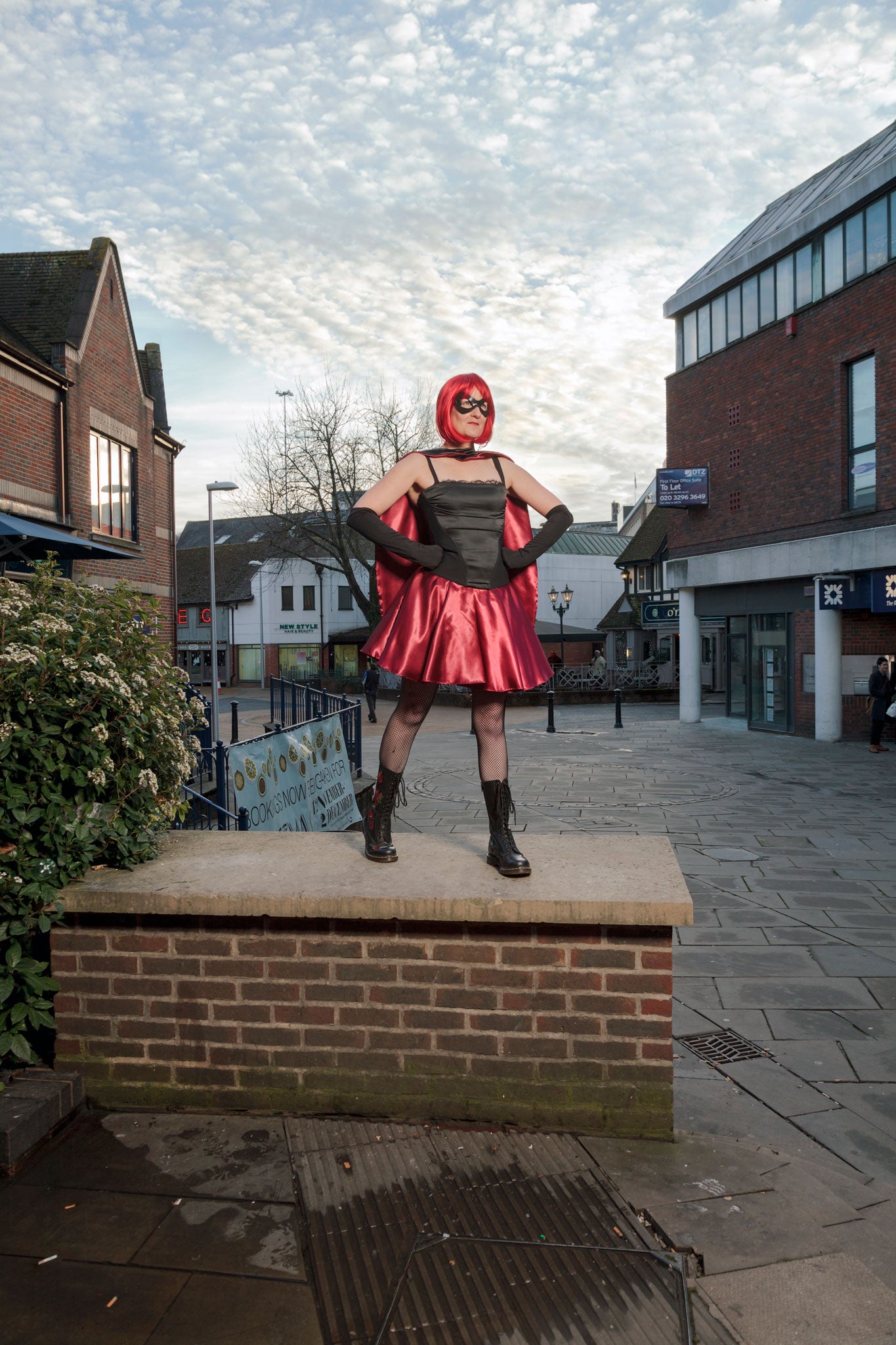
Your support helps us to tell the story
From reproductive rights to climate change to Big Tech, The Independent is on the ground when the story is developing. Whether it's investigating the financials of Elon Musk's pro-Trump PAC or producing our latest documentary, 'The A Word', which shines a light on the American women fighting for reproductive rights, we know how important it is to parse out the facts from the messaging.
At such a critical moment in US history, we need reporters on the ground. Your donation allows us to keep sending journalists to speak to both sides of the story.
The Independent is trusted by Americans across the entire political spectrum. And unlike many other quality news outlets, we choose not to lock Americans out of our reporting and analysis with paywalls. We believe quality journalism should be available to everyone, paid for by those who can afford it.
Your support makes all the difference.A windy Tuesday morning in High Wycombe, and I am dressed as a superhero. I'm freezing-cold because – as I now discover – superhero costumes function best in warm weather. They certainly aren't designed for this temperature, or this wind, which tugs my cape about, sometimes flaring it behind me (in a way which is, if I'm honest, pretty satisfying), sometimes spinning it round my neck till it resembles a monogrammed bib. I'm wearing a mask, a pair of DMs and a skirt in the same red satin as my cape.
I'm here to see how far my New Year's Resolution can take me: in 2015, I will help my community more. I will be a force for good! Like most people, I already "help" at one remove, through donations to charities. But what if I used more direct tactics? I've just written Vigilante, a novel about a woman who copes with midlife crisis by taking on the persona of a superhero. After so many months in her company, I've started to think her approach might have something to recommend it.
I've cobbled the costume together from garments that have sat in my wardrobe for years (corset), things I've bought for the purpose (mask, wig, boots), and others I've had specially made. I asked my friend Sam, who has a business sewing blinds, whether she'd do a couple of specials for me. To her credit, she barely flinched: "I know a good trick for getting that logo on your cape," she said.
So now there's a glorious "L" swooshing across my back (or my front, depending on wind direction) because, for the next few hours, I'm not Shelley at all. I'm a superhero. I am Liberty.
Getting dressed, I felt sick with nerves. What if nothing happens, and I just look stupid? More stupid? What if it all kicks off and something does happen? Because – just to be clear – I don't have any superpowers. A sedentary worker, I'm barely fit, and this is compounded by a clumsy incompetence which takes hold every time I interact with the physical world. When I asked Thames Valley Police what they thought of my plan, they were not encouraging: "Don't take matters into your own hands," they urged me. "Let us detect and solve crimes."
But then, this morning, as I put on the mask, fear slipped from my shoulders. I felt a surge of uncharacteristic disobedience. Stuff it, I thought, they won't even know who I am. That's the first thing you learn: anonymity sets you free.
In the high street, the market stalls are out. I walk between wind-snapped tarpaulins, keeping my eyes peeled for trouble. Around me, people are doing double-takes. They're pointing. I cannot tell you how fabulous this feels. As an author, I spend my days hunched over a keyboard in my cardigan, and when I do see daylight, I pass more or less invisible.
Invisibility, of course, is the secret superpower of most women over 40. Beyond a certain age, you barely register: a customer requiring a transaction, a moving obstacle to be navigated on a busy pavement. Now, though, I'm merrily visible. I walk down the high street and lots of people who would usually look right through me stare in my direction. They shout things (broadly positive). They raise their mobile phones and take photos. It is true that some of them laugh.
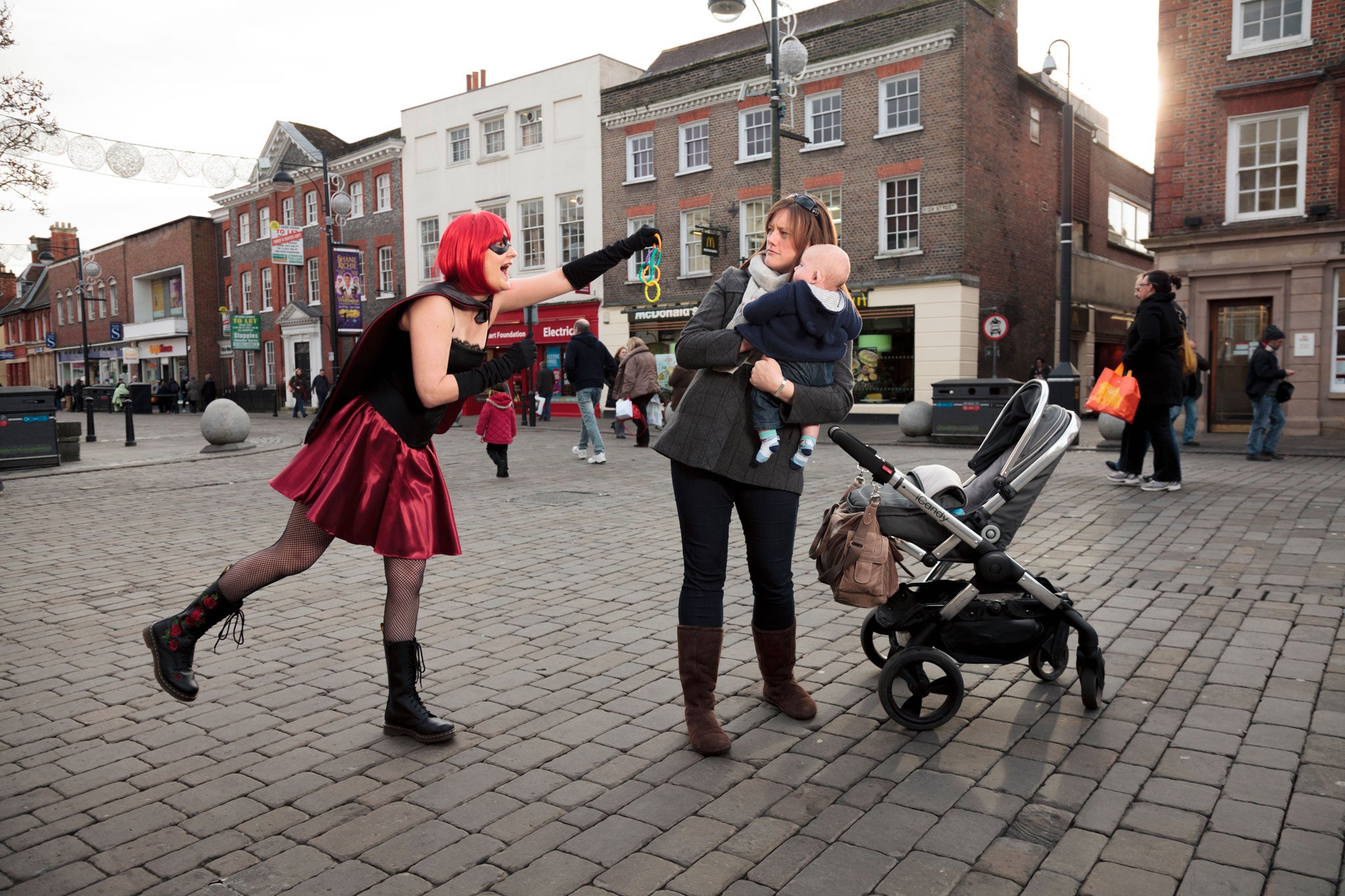
Time's getting on; I want to start bringing down shoplifters as they evade store security. I can't wait to break up a fight. Over the following hour I walk the length of town, taking in shops and the park and the kind of alleyways I imagine might harbour miscreants. I loiter near pubs. I cruise for wrongdoing.
I turn up nothing.
Shivering, I head into the shopping centre, where security men eye me warily. I scan for litter – or even better, for someone in the act of dropping litter – but the place is disappointingly clean. At House of Fraser, I linger near the top of the escalators in case someone struggles with a buggy – but no one needs my help.
"What are you doing this for?" asks one woman. "Is it some kind of project?"
I am tall, I think: maybe I could get things from high shelves. So I loiter in the aisles waiting to do just that, but nobody asks, and I don't have the cheek to offer. In fact, that's part of the problem. To offer help to someone who isn't obviously struggling is just a bit… patronising. I find I'm longing for disaster, just so I can intervene. But disaster won't come. There's just me – my own disaster – walking back to the high street.
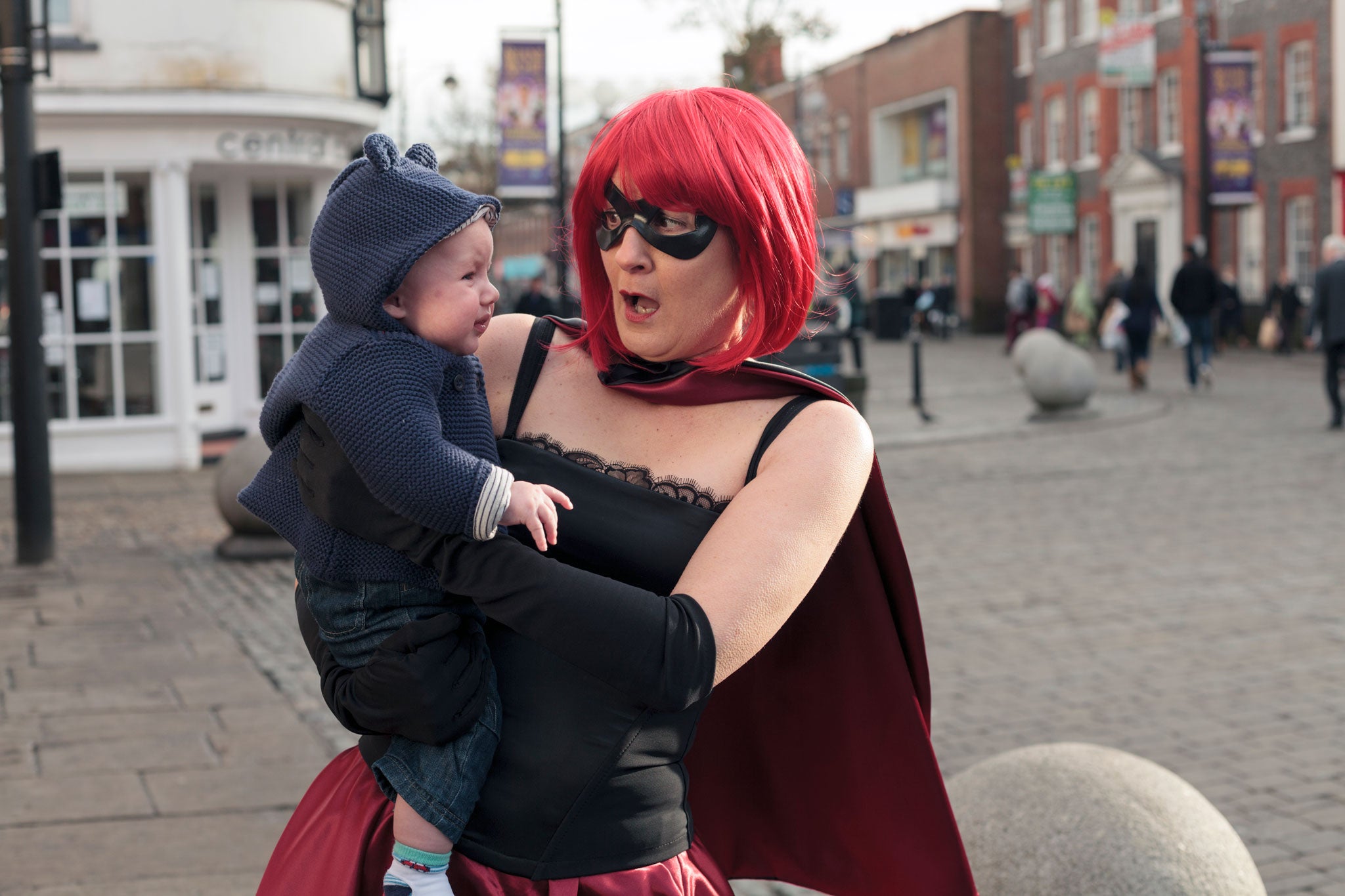
When I see a woman half in and half out of a phone box, trying to make a call while keeping an eye on her baby, I pounce as if it's me who needs the favour. (And it is, of course. By now it's becoming abundantly clear that vigilantes are at least as needy as those they help.)
After some hesitation she lets me watch her son while she uses the phone. I crouch down beside the buggy and grin in my most winning manner. The baby lets loose a stream of wailing, broken only when he runs out of air. There's a brief respite while he refuels, then he unleashes another torrent. Passers-by look at me suspiciously. I shrug and smile. I hope I look bumbling enough to seem unthreatening.
But I've done it: for the first time today I've helped someone (or so I tell myself as the mother cuts short her conversation and emerges).
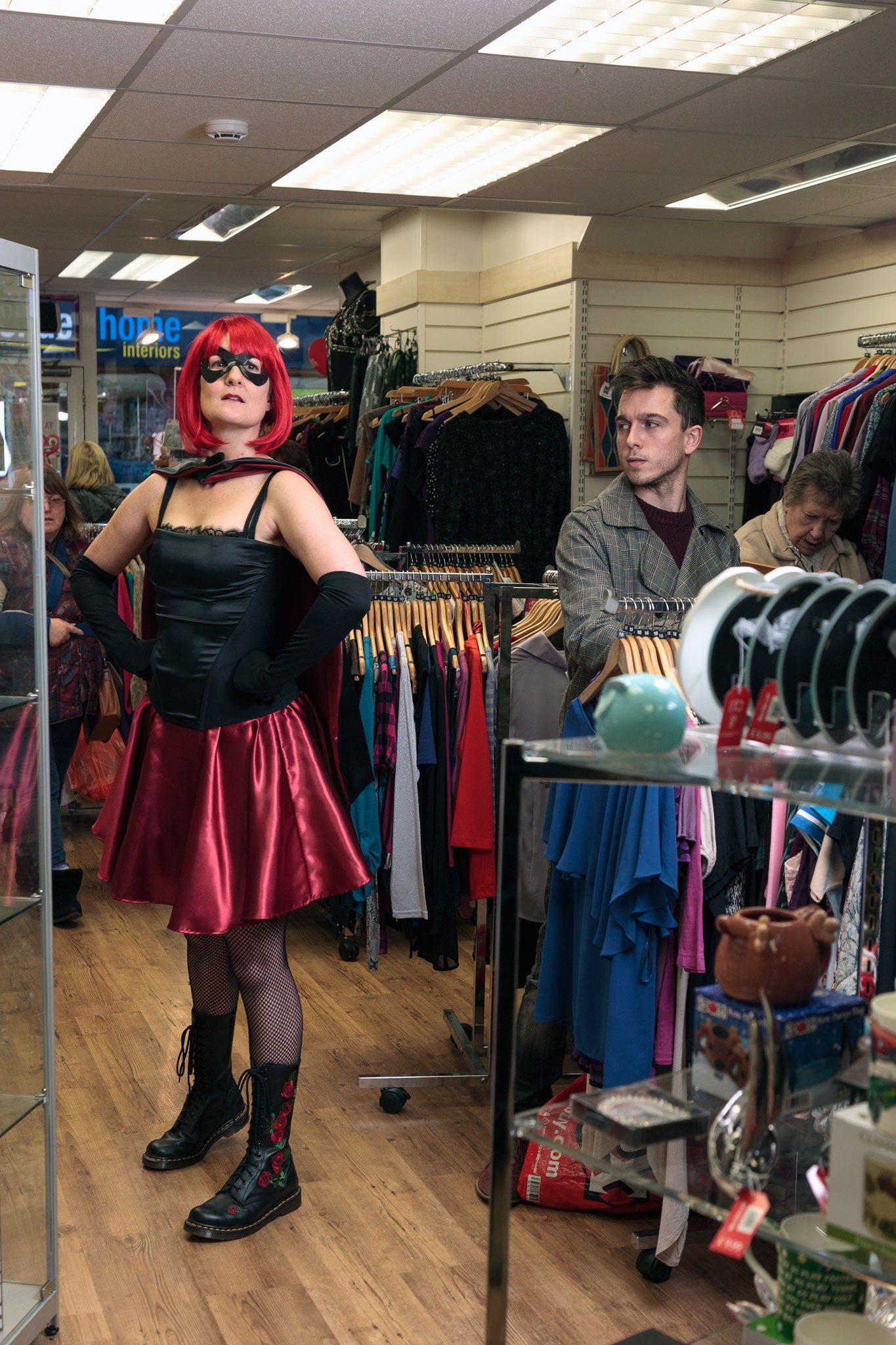
And now I've learnt I have to be proactive. Don't wait for someone to come to you; you're dressed like an idiot and they won't. You must go to them. By the entrance to the shopping centre, a bloke shakes a collection bucket for a charity that addresses children's mental-health issues. He is being almost entirely ignored, and is shivering. I pass him, then double back.
"I've been trying to help people today," I say. "I haven't had much luck. I don't suppose you need…?"
With a mixture of compliance and pity, he lets me stand beside him and lobby for donations. I am painfully conscious that I am doing nothing that's brave, dashing, or even as decent as anything anybody else is already doing. I am a hitcher, a wannabe. And I feel this even before Barack, between shakes of his bucket, starts telling me his story. He's originally from Ethiopia, he says. When he first came to Britain, as a kid, he was homeless, but he's doing fine now. He's at college in London, and every Tuesday he goes out to a different town to collect for the charity, so he can give something back.
"I think I might not be the hero here," I mumble.
He frowns in the direction of my shoulders. "You're cold," he says. "Do you want my jacket?"
"Barack," I tell him, "you're killing me."
When I leave, Barack assures me we've collected more together than he would have on his own. I know he's throwing me a bone, but I feel cheered, almost jaunty. Who else needs help?
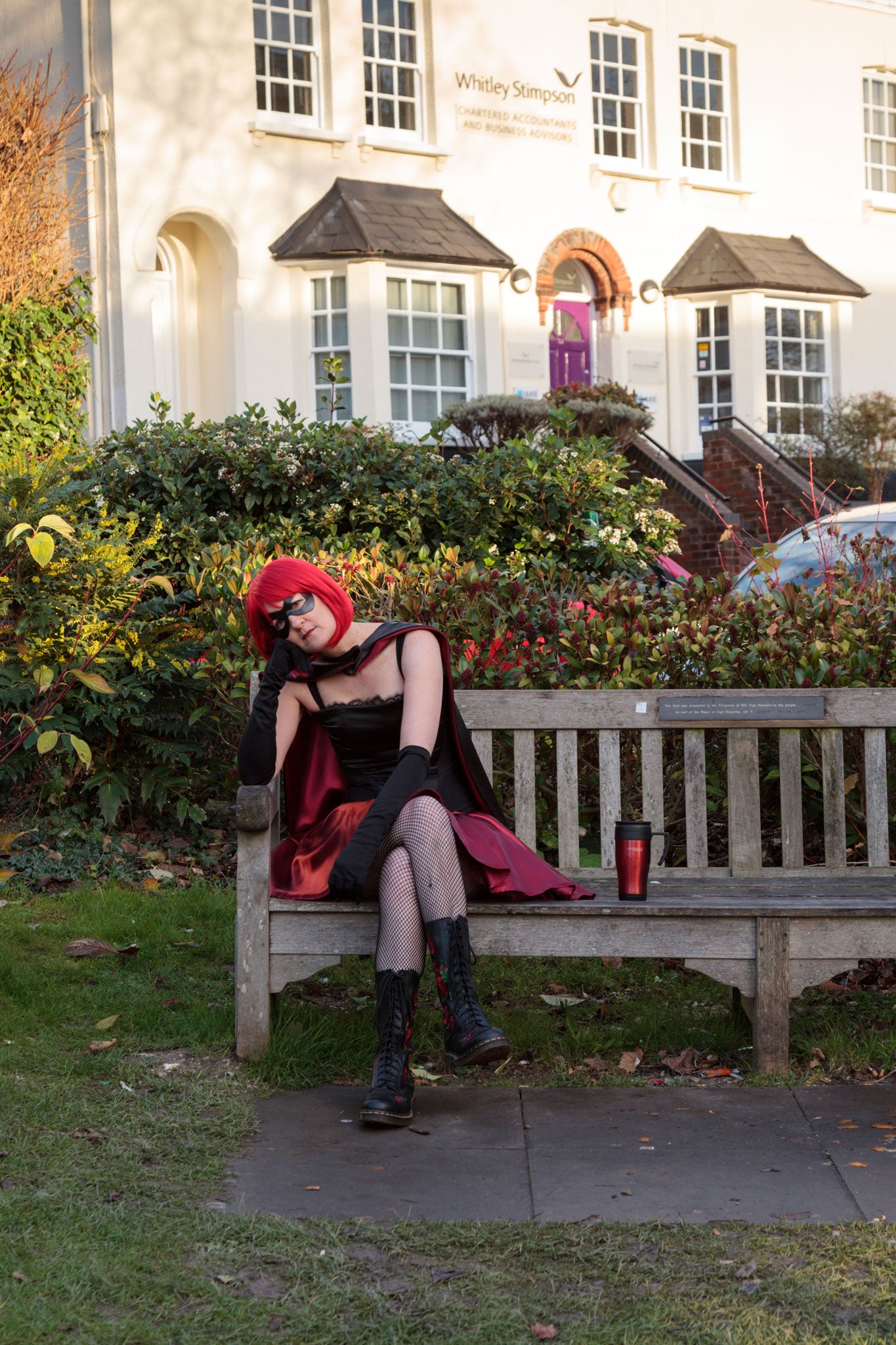
Aware that I've made the subtle shift from would-be crime-fighter to masked Girl Guide, I turn up at the local British Heart Foundation shop and tell them I'm here to Do Good Deeds. This proves to be a great idea, as Jane, the shop manager, is born to live in a world of superheroes. She accepts my proposition without question, gets me a cup of tea and asks my name.
"Liberty," I tell her.
Jane calls me Liberty throughout my time in the shop, and never tries to discover my secret identity. She installs me on the shop floor and arms me with a book of raffle tickets.
I sell 12.
Now, a superhero hawking a dozen raffle tickets wouldn't make for a compelling graphic novel. But, selling those tickets, I feel bizarrely euphoric. It's partly the feeling that I've contributed another tiny bit. And it's partly that when you do something like that, you get to meet people. They are always interesting, and occasionally they cause you to regret that you don't have actual superpowers. One man buys two tickets and hesitates when I ask his address, before explaining that he's homeless. If the first prize (a luxury hamper!) arrives at his hostel, he may be long gone. We chat for a while and he's very good company, though I wish I could do more for him than talk.
When it's time to go, I walk back out into the wind, and a volunteer calls down from the clothes-steaming room: "Cheerio, duck!"
By the end of my day as a superhero, I haven't foiled any dastardly plans or brought down any wrongdoers. I've sold a few raffle tickets and collected some change. But those small things – the things that look like bathos when you're wearing a mask and cape – they've been the parts that matter. In truth, superheroes are narcissists. It's all about me, me, me. When they come to the rescue, they do so in ways that prop up their ailing self-esteem, ways that are dramatic and visible. Barack was doing some genuine rescuing; so were Jane and her volunteers. After a day in costume, my resolution is intact, though the dress code may have changed. In 2015, I really will try to help my community more – but the mask can stay at home.
'Vigilante', by Shelley Harris (£12.99, Weidenfeld & Nicolson), is out now. Her debut novel, 'Jubilee', was shortlisted for the Commonwealth Book Prize in 2012
Join our commenting forum
Join thought-provoking conversations, follow other Independent readers and see their replies
Comments